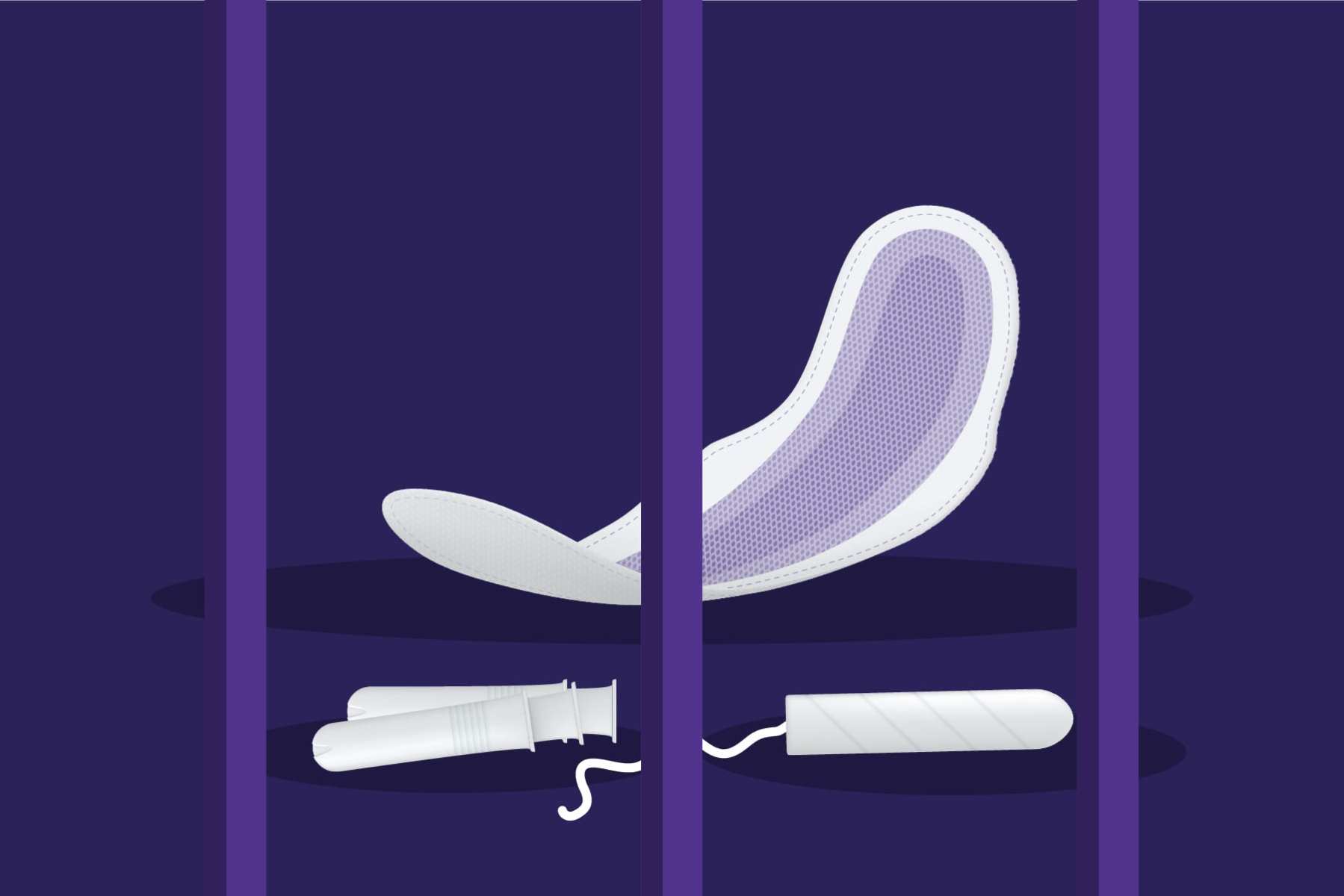Chandra Bozelko kept bleeding, and her options were limited.
It was 2013, and Bozelko was serving a six-and-a-half-year sentence at York Correctional Institution, the only state women’s prison in Connecticut. Her periods continued to get heavier for over a year. But when she sought medical help, the doctors at the prison told her nothing was wrong. The bleeding continued until Bozelko was released in March 2014. She then saw a doctor, who found and removed an ovarian polyp.
Years later, she still remembers the sense of desperation she felt while incarcerated. Unable to get more than an allotted number of pads, Bozelko began reusing them. The prison’s pads were thin, she said, thinner than the pads typically sold outside, and the adhesive barely stuck to her clothes. She once saw another woman’s pad fall to the ground because the glue was so weak, so Bozelko stepped on it, hiding the pad beneath her boot to save her from humiliation. She and her cellmate received five of these pads to share among themselves every week, and asking a guard for another pad often led to a rejected request and ridicule.
Commissary sold a pack of pads for $2.63, Bozelko said, but with prison jobs paying as low as 30 cents an hour in Connecticut, according to a 2017 Policy Initiative study, most people could not afford it on top of other necessities like doctor’s visits, acetaminophen or a phone call to a loved one. As a result, some people fashioned other fabric — towels or cloth ripped from whatever they had — into makeshift pads and were subsequently penalized for destroying public property. Others just bled through their clothes, sitting in their damp, stained garments until the weekly laundry day. (York Correctional Facility declined to comment.)
“It reinforces any kind of powerlessness you have ever felt in your life,” Bozelko said.
Bozelko’s experience is not unique. According to Corene Kendrick, ACLU National Prison Project’s deputy director, the lack of access to period products in prison facilities is widespread, and many incarcerated people are forced to beg guards for the menstrual hygiene products they need.
“It is just the height of shaming and dehumanizing and getting rid of any basic modicum of dignity to compound the trauma that people are experiencing when they’re incarcerated,” Kendrick said.
In 2017, then-Sen. Kamala Harris and her colleagues Sens. Cory Booker, Elizabeth Warren and Richard Durbin introduced a bill to provide free menstrual products to incarcerated people in federal women’s prisons. The Federal Bureau of Prisons issued a guidance memo, separate from Harris’ bill, mandating that menstrual products be available to all incarcerated people in federal correctional facilities at no cost shortly after. In 2018, Congress passed the First Step Act, a more general justice reform effort that included access to menstrual products.
Most states, however, still have no legislation or mandates on period products in state prisons like the one Bozelko was in. Only 12 states and the District of Columbia have passed menstrual equity laws that require no cost menstrual products in state correctional facilities, which means most incarcerated people in the United States still have limited access to the period products they need. And even in the states with menstrual equity laws, implementation might be a challenge.
Kimberly Haven, director of the nonprofit Reproductive Justice Inside, who was also formerly incarcerated, said she submitted a Public Information Act request to find out how different jurisdictions in Maryland are implementing the state bill HB797,which requires no cost menstrual hygiene products in correctional facilities at “certain times.” She helped lead the effort toward legislation for this bill. Robert L. Green, Maryland’s Public Safety and Correctional Services Secretary, visited Maryland’s women’s prison in June 2019 and confirmed with The Washington Post that the prison was not consistently following the policy.
“We can’t fight what we can’t see, and we can’t see what they won’t show us,” Haven said.
While legislation often focuses on providing no-cost menstrual products in correctional facilities, Haven said that cost isn’t the only issue. For instance, the First Step Act of 2018 simply requires the Bureau of Prisons “to provide tampons and sanitary napkins that meet industry standards to prisoners for free and in a quantity that meets the healthcare needs of each prisoner.” Jennifer Weiss-Wolf, vice president for development at the Brennan Center for Justice and founder of Period Equity, said that this wording left too few parameters on distribution and that more narrowly crafted laws have led to better results.
-
Read Next:
Amy Fettig, executive director of The Sentencing Project, a nonprofit group dedicated to shortening prison sentences, said ideally access would be much broader. “What advocates have said is that the pads and tampons should be available in common spaces and restrooms and bathrooms, so that women don’t have to ask anyone, especially officers, for these products,” she said.
Bozelko said that the power dynamic between guards and incarcerated people introduced an element of humiliation whenever someone asked for a menstrual product. Requesting them could also be dangerous: According to a 2019 Period Equity and ACLU report, a Department of Justice investigation found that correctional officers at Tutwiler Prison for Women in Alabama coerced incarcerated people to have sex with them in exchange for access to period products.
The shame of not having enough access can have ripple effects. “I know women who would turn down visits with their family, who would turn down visits with their attorneys, the very people that are trying to get them out of jail and prison,” Haven said.
While these laws “maybe don’t make a dent” for incarcerated people right now, Weiss-Wolf said, it’s still crucial to push for and pass bills for menstrual equity in prisons because it creates a foundation for the future. Facilities are now held responsible by the law.
“The idea of pushing for these bills is partly to educate the public and partly to create a new baseline,” Weiss-Wolf said. “Even knowing it’s going to be very challenging to implement fairly and well, you do have the benefit of the baseline, which is that it is now the law.”
A November 2020 report from The Sentencing Project showed that “the rate of growth for female imprisonment has been twice as high as that of men since 1980. ”Despite this increase, prisons were “literally built for men,” said Pamela Winn, which resulted in a lack of legislation around problems that affect people with periods. She said she hopes more states will pass legislation in the next few years.
The Menstrual Equity for All Act, introduced by Rep. Grace Meng, is a federal bill that would tie a state’s federal funding to a mandate to provide period products to every correctional facility, working toward more widespread period equity in prisons throughout the nation.
“Although we have made progress in combating period poverty, much more work needs to be done so that nobody ever faces challenges with affording and accessing these vital products,” Meng said in a press release.
Period Equity’s state legislation tracker currently shows that 18 states have introduced menstrual equity bills, which sometimes include incarcerated people. Weiss-Wolf said the growing spotlight on both incarceration and period poverty, “a new willingness to do on all sides,” meant the fight for further changes would continue.
“There’s been a vibrant criminal justice movement focused on the conditions and experiences of incarcerated women,” she said. “And the fact that there’s also been a vibrant movement focused on menstruation, the overlap and overlay of those two movements has been really powerful.”





